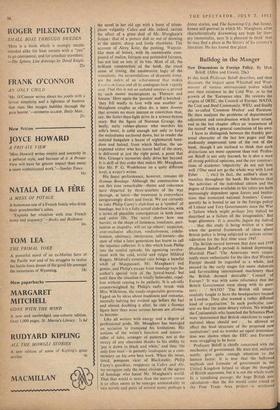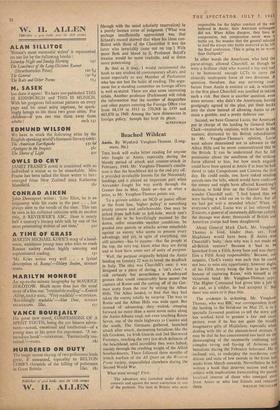Bulldog in the Manger
IN this book Professor Beloff describes, and then discusses, the impact upon Whitehall and West- minster of various international bodies which owe their existence to the Cold War, or to the growth of the `European idea.' He reviews the origins of OEEC, the Council of Europe, NATO, the Coal and Steel Community, WEU, and finally the so-called `Common Market' and Euratom. He then analyses the problems of departmental adjustment and coordination which have arisen, and in the last chapter offers an 'assessment of the record' with a general conclusion of his own.
I have to distinguish between the frankly per- sonal character of the last few pages and the studiously impersonal tone of the rest of the book, though.] am inclined to think that such distinctions are more apparent than real Profes- sor Beloff is not only learned, he is also a man of strong political opinions, and the coy construc- tions of academic 'objectivity' do not suit him well ('One need not go the whole way with Lord Esher . . .', etc.) In fact, the author's slant is manifest throughout the book. He believes that `the activities of the individual citizen and the degree of freedom available to his rulers are both increasingly dependent upon forces and institu- tions that transcend national frontiers.' Conse- quently he is bound to see in the foreign policy of Labour and Tory Governments since the War a 'failure which might perhaps [my italics] be described as a failure of the imagination.' But hope glimmers. 'It is possible [again my italics] . . . that this study is being written at a time when the general framework of ideas about British policy is being subjected to serious recon- sideration for the first time since 1947.'
The British record between that date and 1959 (Professor Beloff's period) is indeed depressing. Marshall Plan? 'The Americans were consis- tently more enthusiastic for the idea that Western Europe should be regarded as a whole, and pressed 'in the early stages for more elaborate and far-reaching international machinery than the British deemed desirable.' Council of Europe? 'It was with some reluctance that the British Government went along with its part- ners. . . .' NATO? `The British still unsuc- cessfully fought to have the headquarters located in London. They also wanted a rather different kind of organisation.' In each particular con- text we find the same dreary refrain. No Wonder the Continentals who launched the Schuman Plan were `determined that British objections to supra- national ideas should not . . . be allowed to affect the final structure of the proposed neW institutions': and no wonder an equal determina- tion was shown when the EEC and Euratom were struggling to be born.
Professor Beloff is chiefly concerned with the mechanics of government. He does not, unfortu- nately, give quite enough attention to the human factor. It is true that the hallowed methods and formulae of government in the United Kingdom helped to shape the thoughts of British statesmen, but it is not the whole truth. In a tantalising passage, the huge British mis- calculation—that the Six. would come round to the Free Trade Area project—is attributedi
(though with the usual scholarly reservation) to a purely human error of judgment. ('What was perhaps insufficiently appreciated was that Erhard's record showed that when his ideas con- flicted with those of the Chancellor it was the latter who invariably came out on top.) With more flesh and blood to it, Professor Belotf's treatise would be more readable, and at times more penetrating.
Be that as it may, I would recommend the book to any student of contemporary affairs, and more especially to any Member of Parliament who has not lost the habit Of reading. The argu- ment for a standing committee on foreign affairs is well re-stated. There are also some interesting titbits. Another professor (Parkinson) will relish the information that the number of despatches and other papers entering the Foreign Office rose from 68,119 in 1913 to 270,968 in 1939 and 603,870 in 1949. Among the 'new dimensions in foreign policy.' bumph has kept its place.
ALTRINCHAM



























































 Previous page
Previous page